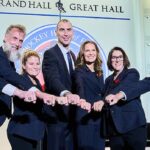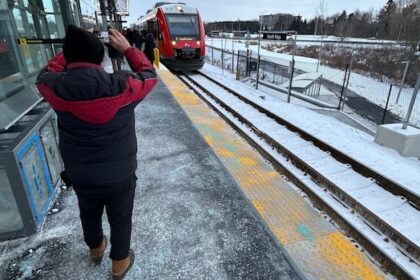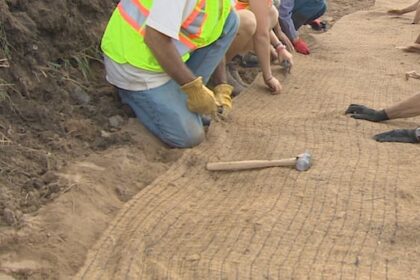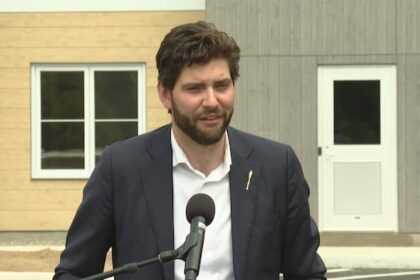ManitobaFor Randi Susanne Gage, the first official Indigenous Veterans Day in Manitoba was an emotional moment, after spending more than three decades fighting to see Indigenous Veterans celebrated for their service and their sacrifices. Hundreds gathered in Winnipeg on Saturday for powwow, feastDave Baxter · CBC News · Posted: Nov 09, 2025 8:37 AM EST | Last Updated: 3 hours agoListen to this articleEstimated 5 minutesThe audio version of this article is generated by text-to-speech, a technology based on artificial intelligence.Hundreds gathered at Sergeant Tommy Prince Place in Winnipeg on Saturday for an Indigenous Veterans Day powwow and feast. (Gavin Axelrod/CBC)Randi Susanne Gage spent more than three decades fighting to see Indigenous veterans celebrated for their service and their sacrifices, so the first official Indigenous Veterans Day in Manitoba was an emotional moment.“When they finally said yes, I cried, and I’m not a crier, but I cried,” Gage said Saturday, days after the the province gave royal assent to Bill 210, the Indigenous Veterans Day Act officially enshrining the day into law earlier in the week.Gage was one of hundreds who gathered at Sergeant Tommy Prince Place in Winnipeg on Saturday for an Indigenous Veterans Day powwow and feast.She said the passing earlier this week of the Indigenous Veterans Day Act was one of the proudest moments of her life, because she knows how much work she and others put into making it a reality. “I gave birth to that puppy, I started that fight,” she said. Randi Susanne Gage says the first official Indigenous Veterans Day in Manitoba was an emotional moment for her, after spending more than three decades fighting to see Indigenous Veterans celebrated for their service. (Gavin Axelrod/CBC)Gage, who was born in the U.S., and is a Vietnam-era veteran who was an Armour Supply Specialist in the United States Army, said she moved to Winnipeg in 1987. Soon after she arrived in Manitoba, Gage said she started hearing stories of Indigenous veterans being discriminated against when they returned home after serving their country. Despite their service, many Indigenous veterans who returned home after both the First and Second World Wars, as well as the Korean War, were often not afforded the same benefits and opportunities that non-Indigenous veterans received once they were discharged. “I was talking to these veterans, they would find out I’m a veteran, and we’d get talking, and I would hear these stories and it made me angry,” she said. “This was my home now, and so it’s my job to speak.”Hundreds gathered at Sergeant Tommy Prince Place in Winnipeg on Saturday for an Indigenous Veterans Day powwow and feast. (Gavin Axelrod/CBC)’No one ever really stood up for them’On Nov. 11, 1991, a group of Kanien’kehaka (Mohawk) veterans tried to place a wreath during the Remembrance Day ceremony but were refused. They were also prohibited from laying wreaths at cenotaphs or entering Legion halls to celebrate with fellow soldiers. The following October, Gage was part of a meeting in Ottawa where the National Aboriginal Veterans Association was established. She served as the founding secretary/treasurer of the Manitoba Aboriginal Veterans Association, and the charter vice-president of the National Aboriginal Veterans Association.Gage said during the meeting, discussions were also held about establishing a day to honour Indigenous veterans. She said she was given a mandate to “get a day for them.” The first Indigenous Veterans Day was observed in Winnipeg in 1993 on Nov. 8 of that year.”And the eight, of course, we picked that because if you flop an eight over, it looks like the infinity sign for the Metis and you take an eight, it breaks into fours and there’s four levels above and four levels below, that form the seven that a lot of traditional people know about,” she said. Gage and members of NAVA also laid at wreath at the National War Memorial in Ottawa during their meeting in the fall of 1992. “It would be the first time Aboriginal Veterans were allowed to make such a gesture for their fallen colleagues,” Gage wrote in a summary of events given to CBC News. Randi Gage shares a photo of the wreath placed at the National War Memorial in Ottawa on Nov. 11, 1992. (CBC)A month later, they also laid a Remembrance Day Wreath at the National War Memorial, which is considered to be the first time Indigenous Veterans had done so on the day. “Placing the wreath was magical … I can’t even explain it,” she said. Gage has now spent more than 30 years working as an advocate on behalf of Indigenous veterans. She has travelled across the country to speak with those who served, and presented the struggles of Indigenous veterans to the Canadian Senate twice.She said she continues to fight for Indigenous veterans because she continues to be appalled by the treatment many have received when returning from service. “A huge part of this nation, the original peoples of this nation have been discriminated against, have been treated deplorably,” Gage said. “No one ever really fought for them, no one ever really stood up for them.”Métis veteran Devin Beaudry, who served in the Canadian Armed Forces for 35 years, was also at Saturday’s powwow. He said some Indigenous veterans who are no longer with us would marvel at the way they are now being celebrated. Métis veteran Devin Beaudry, who served in the Canadian Armed Forces for 35 years, said some Indigenous veterans who are no longer with us would marvel at the way they are now being celebrated. (Gavin Axelrod/CBC)“They would think that it’s something that would never come to pass, for how they were treated when they came back, not only from the world wars, but also from Korea and Afghanistan,” Beaudry said. “Just with the way they were treated — knowing that this day has actually passed, they’d be rejoicing that the recognition is finally there.”A ceremony on Long Plain First Nation and another hosted by the Manitoba Métis Federation in Lac du Bonnet, which included a flypast from the Royal Canadian Air Force, were among other Indigenous Veterans Day events were held in the province Saturday.“Indigenous Veterans Day is not a second Remembrance Day, it is a day where we reflect on the experiences of Indigenous veterans, whose contributions are as distinct as the Nations they come from,” MMF Minister for Red River Métis Veterans Shawn Nault said in a press release. “Our Red River Métis Veterans were sharpshooters and trackers, who stood up to protect Canadian values, often at times when Canada was actively ignoring their existence.”ABOUT THE AUTHORDave Baxter is an award-winning reporter and editor currently working for CBC Manitoba. Born and raised in Winnipeg, he has also previously reported for the Winnipeg Sun and the Winnipeg Free Press, as well as several rural Manitoba publications.With files from Gavin Axelrod
Wednesday, 4 Mar 2026
Canada – The Illusion
Search
Have an existing account?
Sign In
© 2022 Foxiz News Network. Ruby Design Company. All Rights Reserved.
You May also Like
- More News:
- history
- Standing Bear Network
- John Gonzalez
- ᐊᔭᐦᑊ ayahp — It happened
- Creation
- Beneath the Water
- Olympic gold medal
- Jim Thorpe
- type O blood
- the bringer of life
- Raven
- Wás’agi
- NoiseCat
- 'Sugarcane'
- The rivers still sing
- ᑲᓂᐸᐏᐟ ᒪᐢᑿ
- ᐅᑳᐤ okâw — We remember
- ᐊᓂᓈᐯᐃᐧᐣ aninâpêwin — Truth
- This is what it means to be human.
- Nokoma











